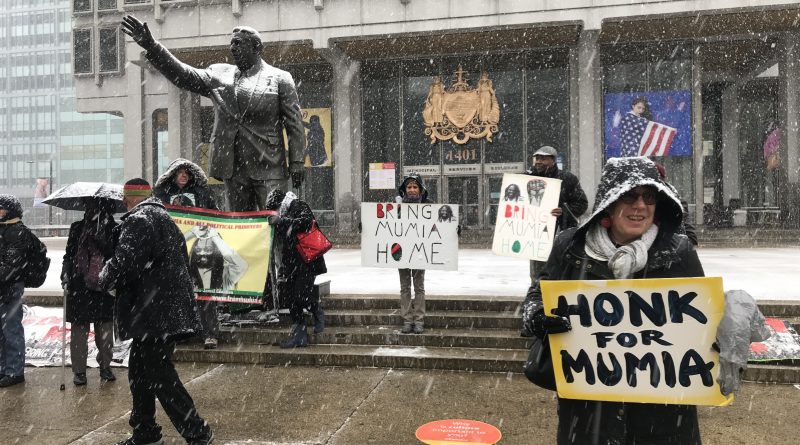Community Organized In Support Of Mumia Abu-Jamal
BY CLAIRE HALLORAN
In 1981, Mumia Abu-Jamal was arrested for the murder of Philadelphia police officer Daniel Faulkner. As his case progressed, Abu-Jamal would become the most famous person on death row, after being unanimously sentenced to death by a jury in 1982, despite maintaining his innocence since the event.
Fast forward 30 years, and he is sentenced to life, as the prosecutors no longer wanted to pursue the death penalty.
Fast forward another 6 years, and supporters from around the globe are still organizing to protest the alleged unfair trial Abu-Jamal received.

“He did not receive a fair trial,” said Linn Washington, a journalism professor at Temple University, who has been covering Abu-Jamal’s case since the first day back in 1981. “It has become a national embarrassment, for not only the United States but particularly for Pennsylvania. People around the world hold demonstrations and march on his behalf.”
On December 9 of 2017, exactly 36 years since the shooting, dozens of supporters gathered to protest in front of the statue of Frank Rizzo, mayor of Philadelphia 1972 to 1980, on Broad Street to show support for Abu-Jamal, and spread awareness for the objections to the ruling, as many of the younger residents of Philadelphia are unfamiliar with the historic case.
The trial of Abu-Jamal has been criticized from governments and organizations around the world since the morning of December 9, 1981, when Abu-Jamal was driving a taxi near the intersection of Locust and 13th street in Philadelphia. Abu-Jamal saw his brother, Billy Cook, engaging in a physical altercation after being pulled over for a traffic stop by officer Faulkner. Abu-Jamal exited his taxi and approached the scene. From there, until more police arrived, the details are unclear.
When more police did arrive, however, Billy Cook was found spread eagle on a wall, while Faulker lay dead after being shot in the back and face. Abu-Jamal had been shot by Faulkner in the stomach, and both the men were transported to Thomas Jefferson Hospital, where many reports allege Abu-Jamal was beaten by the police inside the emergency room.
Shortly after, Abu-Jamal was taken to the Police Headquarters and charged with first-degree murder, and in June of 1982, the case was brought to trial with the entire city’s eyes watching as the controversial, complex case proceeded.
Before the crime was committed, Mumia Abu-Jamal was a fairly well-known journalist in Philadelphia. Six years before the trial, Abu-Jamal was pursuing radio newscasting at Temple University’s WRIT until 1978. Abu-Jamal frequently reported on MOVE, and was the president of the Philadelphia Association of Black Journalists.
Amnesty International, a non-governmental London-based organization focused on defending human rights, released a study of Abu-Jamal’s case in 2000, and concluded that it was riddled with human rights violations and racial biases.
The report mentions the disadvantages forced on Abu-Jamal began from the first day in pretrial, when Anthony Jackson was assigned to defend Abu-Jamal. Jackson, who had never before dealt with a murder case, had his license allegedly threatened by the Pennsylvania Supreme Court. Abu-Jamal and his supporters quickly realized that Jackson was unfit to represent Mumia, and Abu-Jamal made the decision to represent himself.
Today, it is illegal for a lawyer to be assigned to a murder case if they have no previous experience, and two lawyers must be assigned to any case as serious as Abu-Jamal’s.
The perceived injustice and prejudice continued as Judge Albert Sabo threatened to take away his right to represent himself if he was “disruptive”. Judge Sabo is frequently pointed to as the main cause for the alleged unfairness of the trial, as he would put most of Abu-Jamal’s objections in court “under advisement”, so no appeal or action could ever be taken. He also had a history of “favoring prosecutors” during the jury selection and instruction process.
History repeated itself in Abu-Jamal’s case, as Judge Sabo refused to allow Abu-Jamal to represent himself during the jury selection, causing Amnesty International and others to question whether the jury selection was fair, considering it underrepresented the black population of Philadelphia at the time, which was 40 percent, while only 2 of the 16 members of the jury were black.
The removal of Abu-Jamal from the courtroom became a trend throughout the case, making it increasingly difficult for Abu-Jamal to represent himself, which caused Abu-Jamal to be tried absentia for a large portion of the trial.
The Amnesty International report also mentions the confusion and questionable behavior of the witnesses brought in to testify.
Two of those witnesses, Cynthia White and Veronica Jones, were prostitutes with multiple convictions. While White testified that she saw Abu-Jamal shoot Faulkner, she frequently changed her mind about the details of the shooting.
Jones, on the other hand, did not testify that Abu-Jamal shot Faulker, but suggested that she had been pressured by the police to do so.
“They [the police] were trying to get me to say something the other girl [White] said,” Jones said during the trial. “I couldn’t do that…they [the police] told us we could work the area [as prostitutes] if we tell them [that Abu-Jamal was the shooter].”
Washington has coined a term for the injustice seen throughout the case and its appeals, “the Mumia exception.”
According to Washington, a series of decisions on states and the national Supreme Court relating to Abu-Jamal’s case have resulted in the overturning of dozens of other cases, but never Mumia’s.
One example of this was a decision made about the relevance of the defendant’s personal associations.
In Abu-Jamal’s case, his history with the Black Panther Party was brought up, as the prosecutors said his motive could be blamed on his association with the group as he has “harbored a desire to kill cops” due to his membership. They neglected to mention that he had not been a member of the organization for 12 years, which makes many outside viewers question its relevance.
“There have been some changes, but there are still people falsely incarcerated, and the judicial review is still too farcical,” Washington says.
In another murder case, Flanagan v. State, the defendant objected to the prosecutor using his connection to a devil-worshipping group, and the U.S. Supreme Court decided that it was unconstitutional to use personal affiliations against a defendant, and his conviction was overturned. Despite the fact that this same argument could be used for Abu-Jamal, he was never allowed a new trial.
Another example of this exception can be seen in the penalty phase of the trial, when Abu-Jamal was not allowed to exercise his right to allocution, as Sabo allowed for the prosecutors to cross-examine him during his chance for redemption.
In February of 1989, the Pennsylvania Supreme court ruled that allocation is such an ancient right that any violation of that right at any moment of a case it requires a new trial,” Washington said. “But weeks later, when Mumia’s case came up, they changed their minds.”
The supporters of Abu-Jamal look to an alternate series of events to explain what happened on the morning of December 9. Many believe that there was a fourth person on the scene, a man named Kenneth Freeman, who was a close friend of Cook, and most likely riding in his car that morning. The presence of Freeman at the scene was known to the prosecutors but concealed from the jury.
Other supporters of Abu-Jamal have no alternate theory, and some even believe he did commit the crime, but all agree that his trial was unjust and deserves a new trial.
“Is there any value in redemption,” Washington asked. “Well, yes. Here’s a guy who is now working on his PhD, he graduated from college and graduate school while on death row. He is a person who, while on death row, has authored six books and is constantly writing. He is an extraordinary person to go through all he’s gone through and maintained his sanity.”




